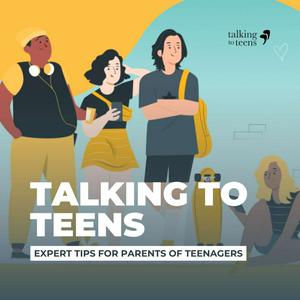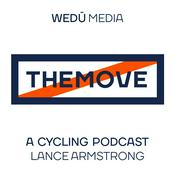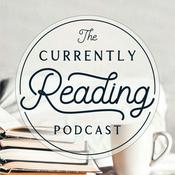Talking To Teens: Expert Tips for Parenting Teenagers

321 episodes

Ep 342: Hot vs. Cold Communication Explained
13/7/2025 | 26 mins.
Kenneth Ginsburg, author of Lighthouse Parenting, explains how parents can build lasting bonds with teens by balancing structure, trust, and unconditional love, and shares practical communication strategies.Full Show NotesWe often hear that teens thrive best when they feel deeply understood, loved without judgment, and gently guided rather than controlled. But this balance is hard to strike—especially as teens push away, test boundaries, and become more independent. Too much freedom feels unsafe, yet too much vigilance breeds rebellion. How can we stay close, set boundaries, and respect teens' autonomy, all at the same time?The secret might lie in what Dr. Kenneth Ginsburg calls “lighthouse parenting". Instead of hovering anxiously like a helicopter, micromanaging like a lawnmower, or retreating entirely, a lighthouse parent provides steady guidance from the shoreline. They trust teens to navigate life's waves yet remain watchful, reliable, and ready to help when needed. Done right, this blend of love, boundaries, and respect leads to children who flourish not just during adolescence, but also maintain a strong, loving connection with parents throughout adulthood.Dr. Kenneth Ginsburg is a leading pediatrician, adolescent health specialist, and author of numerous influential books, including his latest, Lighthouse Parenting: Raising Your Child with Loving Guidance for a Lifelong Bond. Through decades of research and practical experience working with adolescents and families, Ken has identified simple yet powerful ways parents can connect with teens while also helping them cultivate strength, compassion, and resilience.In this episode, Ken shares the key ingredients of lighthouse parenting and how to implement them practically, starting today. From smarter ways to praise and discipline, to addressing judgment and communicating more calmly, you’ll learn actionable insights you can put into practice immediately.The Lighthouse Approach to ParentingWe start our conversation by unpacking what lighthouse parenting actually means—and why it works. Ken explains that decades of research identify balanced parenting as the gold standard: consistent boundaries combined with genuine warmth and flexibility. The challenge has always been how to achieve this balance in real daily interactions.The lighthouse metaphor brings clarity to that balancing act. A lighthouse is stable and dependable. Instead of running out to rescue every time the waters get rough, it provides a steady beam, trusting the sailor to learn how to navigate. Likewise, lighthouse parents deeply love their child and provide consistent boundaries, but also trust teens to handle challenges, make mistakes, and learn from them. This fosters competence, confidence, and lasting closeness.Making Communication Effective, Not Just EmotionalKen reveals how many conversations go awry because we mistakenly use what he calls “hot communication"—reactive, emotionally-charged messages filled with judgment or exaggerated empathy. Hot communication sets off teens’ emotional brains and blocks logical thinking. On the other hand, "cold communication,” which Ken says is actually warm, calm, and emotionally soothing, allows teens to feel safe enough to open up and engage productively.In the episode, Ken offers practical scripts for communicating in a cooler, more effective way and avoiding judgment. He shares how even subtle judgments (criticizing neighbors or yelling at the TV) make teens less likely to open up about sensitive topics. He also discusses the dangers of praising only achievements, inadvertently signaling conditional love, and describes ways to praise kids that reinforce unconditional love and openness.Protecting By Preparing, Not HoveringOverprotective, hovering parenting is tempting when we desperately want to keep teens safe. But Ken makes a compelling argument that true protection comes from preparation, not control. Teens who haven't practiced decision-making, conflict-resolution, or recovering from failure at home often make mistakes outside the safety of the family when stakes are higher.Through reminders and reflection exercises, Ken shows how parents can dilute their helicopter tendencies by asking key questions about what protection actually means for lifelong success. Instead of rescuing teens from every difficulty, lighthouse parents allow adolescents space to solve problems, while maintaining protective guardrails, setting the stage for healthier independence and interdependence.Fostering Interdependence and Strong CharacterStrong families rely on mutual interdependence, yet modern society too frequently emphasizes independence and self-reliance, damaging teen-parent bonds and emotional wellbeing. Ken passionately argues we need to raise young people who not only stand strong but also know how to lean into lasting family support systems when needed.As teens mature into adulthood, Ken believes that intentionally nurturing key character strengths—such as gratitude, humility, generosity, compassion, and responsibility—is foundational to their success and happiness. In our interview, Ken offers powerful examples of how parents can recognize and reinforce constructive behaviors to strengthen character starting from early childhood up through the teen years, ultimately shaping a purposeful, joyful adult life.In the Episode…Our conversation covers so many insightful ideas, and you won’t want to miss the impactful topics we discuss:Why praise and excessive empathy can accidentally backfireSpecific scripts to motivate teens using their strengthsUnderstanding judgmental behaviors you might not even realize you're doingWhy cell-phone discipline isn't always the right answer, and how to handle tech smartlyPractical tips for enjoying happier, higher-quality “high yield” conversations with your teenIf you've ever worried whether your approach is helping or harming your relationship with your teen, this episode is a must. Dr. Ginsburg’s warm, insightful perspective and practical strategies empower parents to build deep bonds that last a lifetime.Check out all of Ken’s resources at fosteringresilience.com or parentandteen.com, and don't forget to grab your copy of Lighthouse Parenting. If you loved this episode, please subscribe to the podcast and share this profound knowledge with other parents and educators you know.

Ep 341: Launching Your Teen into Adulthood
16/6/2025 | 21 mins.
Robert Finlay, author of Hey Dad, shares essential strategies on how parents can equip teens with crucial adulting skills, covering money management, networking, handling emergencies, and building independence.Full Show NotesDo your teens sometimes shock you with questions you assumed they already knew the answer to? Maybe they call in the middle of the night wondering how to fill gas in their car or whether they can use the mysterious "green gas." These “Hey Dad” (or "Hey Mom") calls are more than just amusing anecdotes—they highlight a gap we're all trying to fill as parents: how do we ensure our teenagers really understand the requirements of adulting before they leave the nest?Most parents worry whether they have properly prepared their kids for adulthood, for those surprising (and inevitable!) real-world circumstances. But with teens constantly occupied by schoolwork, sports, friends, and the digital world, how can we efficiently—and effectively—pass along the essential skills needed to confidently step into adulthood?Our guest this week, Rob Finlay, found himself pondering the same question after repeated "Hey Dad" calls from his four kids. Inspired by these moments—and a particularly memorable call from his daughter asking about gas options—Rob set out to gather the necessary knowledge teens needed. After collecting advice and insight from over 30 experts ranging from finance executives to medical specialists and seasoned first responders, Rob compiled Hey Dad: Everything You Should Have Learned About Life But Didn’t, a hands-on guide to navigating early adulthood.In our conversation, Rob shares practical tips and hilarious stories to help parents bridge life-skill gaps with their teens. We discuss how to approach money management, prepare kids for career uncertainties, teach networking fundamentals and handle emergencies without panic, and ultimately shift those seemingly trivial late-night phone calls into moments that reflect growth and independence.The Power (and Peril) of Teen MoneyMany parents know the frustration of seeing their teen disregard financial advice, only to later scramble when reality hits. Rob stresses that simply "lecturing" teens about finances rarely sticks—instead, he recommends leveraging conversations about actual real-world consequences. Rob illustrates how introducing basic concepts with compelling scenarios can make money feel relevant to teens. Whether exploring the benefits of good credit scores or the hidden costs of overdrafts, making finances meaningful prepares teens better than abstract and dry instructions ever could.Rob also discusses the power of "compounding" beyond just a financial context, underscoring how even small, consistent actions build substantial results over time—not just in savings, but also in relationships, networking, and personal habits.Networking for Young AdultsEver heard your teen wishfully mention becoming a digital influencer or shrug off job opportunities because it doesn't align with their unclear plan for the future? Rob emphasizes the reality that connections matter profoundly when seeking employment opportunities. He encourages parents to expose teens to situations outside their peer groups and comfort zones—from attending family business dinners to encouraging brief informational interviews with professionals in fields of interest.Rob reminds us that teens are more respected and supported by adults than they realize. Teaching teens to leverage LinkedIn or encouraging them to reach out for career advice fosters self-confidence, creates diverse connections, and transforms the job market from a daunting challenge to a network-driven opportunity."Real World" Readiness and Handling EmergenciesEvery parent dreads the thought that their teen will one day encounter an emergency situation. But as Rob shares, there are essential skills every young adult should know, from handling first-aid emergencies all the way through troubleshooting car issues when stranded late at night.Incorporating expert insights from professional first responders, Rob advises parents on walking teens through emergency preparedness so they can remain calm and in control when it matters the most. After all, adulting skills also go beyond financial independence—they mean knowing how to stay calm when things inevitably don't go as planned.Embracing the JourneyAbove all, Rob emphasizes preparing teens not just for immediate independence but for flexible, resilient, lifelong growth. He illustrates how important it is for teens to accept uncertainty and potential failure not as setbacks, but as essential parts of the journey. By modeling and teaching these attitudes, Rob believes we can elevate those unforgettable phone calls from anxious dependency into mature, genuine moments of bonding and learning.In The Episode…Rob’s insights offer practical solutions to parents seeking to empower their teens for real-world readiness. In addition to these core topics, we explore:Why it's essential to let teens fail (and why failure can be productive)How to help teens realize the real benefits behind college decisionsWays to shift from "giving answers" to mastering the art of guiding teens resourcefullyHow adulting skill-building can extend even to occupying oneself on a quiet night at homeRob Finlay's practical wisdom and instructive energy make this episode indispensable listening for every parent who wants to transform their teen's uncertainty into confident independence. The next time your teen calls around midnight, you'll not only know how to handle the call—you'll welcome the growth behind it. Tune in for more, and don’t forget to subscribe!

Ep 340: Why Teens Need You to Listen Differently
02/6/2025 | 19 mins.
Christine Miles, author of What Is It Costing You Not to Listen?, teaches us how transformational listening can deepen connections with teenagers by hearing what's unsaid, asking the right questions, and creating life-changing conversations.Full Show NotesWe all think of ourselves as pretty good listeners, right? But consider this: 96% of us claim good listening skills, yet only 2% have ever had formal training in how to listen. As parents, teachers, or mentors of teenagers, we spend so much energy worrying about what we say in conversations—we want to give advice, teach life lessons, and help teens make the right decisions. But the truth is, we often completely overlook the real key to meaningful communication: our ability to listen deeply.Most of our listening approaches barely scratch the surface and simply skim the basic facts of a situation. However, teens rarely communicate straight to the heart of what’s truly bothering them. A surface complaint or confrontation can disguise deeper emotional struggles. How can we move beyond mundane conversation and create more meaningful connections with the young people in our lives?Our guest Christine Miles, author of What Is It Costing You Not to Listen?, is a renowned listening expert and speaker, who has spent her life empowering people to tap into what she calls “transformational listening.” Christine’s groundbreaking work has led her to teach listening workshops nationwide, helping families, educators, and corporate teams unlock deeper understanding, resolve problems, and build authentic connections through the power of listening better.In this thoughtful and eye-opening episode, Christine shares powerful insights from her personal story and her professional expertise to demonstrate exactly why listening is so crucial, and how developing listening skills will profoundly affect all aspects of our relationships with teens.Why Teens Need Transformational ListeningChristine introduces the idea of transformational listening, which goes beyond empathy and allows us to truly hear not only the words teens speak but also their underlying and often unspoken feelings. Transformational listening helps us understand each teenager's unique experience. Christine explains how listening provides teens a safe space to truly open up by guiding them to reveal parts of their story they may not even be aware of themselves.One major reason parents and teens experience poor communication is because teens rarely start at the beginning when they share their story. According to Christine, we usually get dropped right in the middle of a teenager’s internal narrative, causing misunderstanding or confusion. Parents often mistakenly assume that teens don’t want to talk or be open. Christine teaches us how to navigate conversations strategically to capture the whole story and not just surface details.How to Stop Getting in Your Own WayMost of us unconsciously interfere with our own listening ability, making typical mistakes like asking too many questions or imposing assumptions onto teens’ stories. Christine helps us recognize and prevent these conversational pitfalls by sharing simple but incredibly effective techniques she calls the Listening Compass. We'll learn a small but powerful set of open-ended questions that invite teenagers to dive deeper without feeling interrogated or misunderstood.Christine also explains how to notice important non-verbal listening cues by paying attention to what teens aren't saying. Mastering this technique helps teens feel truly understood, even when they're struggling to articulate what's actually bothering them, allowing us to support or steer the conversation positively without forcing direct solutions on them prematurely.Discovering Your Teen’s True StoryChristine emphasizes the incredible power of finding the "tipping point"—the moment in stories or conflicts when a decision or realization occurs and everything shifts. Often teenagers present us with a seemingly minor problem (like shoes or school struggles), but beneath the surface lies a complex mix of emotions or concerns teens don't even consciously realize. By engaging in transformational listening, parents can genuinely empower teens, helping them discover and navigate their emotional challenges and even reach deeper insight about their own decisions.Christine shares impactful stories and case examples, illustrating how parents and mentors using these listening practices earned trust and ultimately became part of life-changing turning points simply by listening in a new way.Taking Listening to Real LifeThe beauty of Christine's approach is that the tools she teaches can be practiced right away, leading to rapid and transformative results in relationships with teenagers. Christine shares moving real-life examples—not just from parenting, but from workplaces and friendships—where transformational listening has allowed meaningful conversations to flourish, deeper trust to build, and healthier emotional decision-making to happen.Christine explains why feelings do matter, even when societal messages often teach us to keep emotions separate from work or challenging situations. Her insights expand our emotional intelligence, improving not just our teen relationships but demonstrating how attentive listening benefits nearly every aspect of our public and private lives.In this powerful conversation, Christine provides clear steps and tools to start implementing transformational listening immediately, teaching us how to revolutionize the ways we communicate with and understand teens.In the Episode, we also discussWhy focusing on your response interferes with listening effectivelyHow emotional intelligence can matter more for teen success than academic gradesWhy saying “Don’t get mad, but…” almost always backfiresHow listening skills can vastly improve communication in workplaces and schools as well as at homeIf you want to strengthen your connection with the teens in your life and genuinely help guide them towards growth and emotional maturity, don’t miss this groundbreaking episode! And don't forget to subscribe for more insightful guests and inspiring strategies every week.

Ep 339: Ending Imposter Syndrome for Teens
26/5/2025 | 20 mins.
Richard Orbé-Austin, author of Your Child's Greatness, discusses imposter syndrome, perfectionism, boundaries, and how parents can empower teens to build true resilience and self-confidence.Full Show NotesAs parents, we want the best for our teenagers. We hope they'll be successful academically, thrive socially, and embrace the opportunities ahead. But lurking beneath the surface for many adolescents—and adults—is the pervasive doubt called imposter syndrome: the haunting fear of being revealed as a fraud, not belonging, or never being good enough. Surprisingly common, imposter syndrome can emerge quietly and lead our teens toward patterns of perfectionism, people-pleasing, anxiety, and even deeper stress.But how can parents recognize the signs of imposter feelings in their kids? And more importantly, how do we help teens develop the resilience, confidence, and realistic self-image that protect them against its harmful effects?To unravel these questions, we're joined by Dr. Richard Orbé-Austin, psychologist and co-author of Your Child's Greatness. An expert on imposter syndrome, Richard understands how these subtle feelings of doubt can sometimes quietly shape a person's identity, often beginning at a young age. He provides practical, down-to-earth strategies parents can use to nurture healthier mindsets in teens, helping them genuinely own their strengths while managing the anxieties involved in growth and change.Understanding Teen Imposter SyndromeRichard first helps us understand exactly what imposter syndrome means. Though not an official mental health disorder, "Imposter Syndrome" describes the chronic feeling that your success is undeserved or accidental, despite evidence to the contrary. As Richard explains, it often surfaces in perfectionist individuals who strive for an elusive, unrealistically perfect "ideal self" and become critical of their actual self. It's common among high-achievers, causing them to attribute their success to luck or external factors instead of their own abilities.In our discussion, he describes three common roles teens pick up early on—the "smart one," the "hardworking one," and the "survivor"—and how over-identifying with any one role can contribute to imposter feelings. He helps parents recognize subtle symptoms of these thoughts, like negative labeling, comparing themselves unfairly to others, and anxious attempts to predict future failure.Breaking Boundaries for True Self-WorthOne critical contributor to imposter syndrome, according to Richard, is a family environment lacking clear, healthy boundaries. Teenagers who grow up believing their sole purpose is pleasing their parents, coaches, or teachers often develop intense feelings of inadequacy, as they never feel truly good enough. They’re likely to overwork, avoid conflict, and suppress their own emotional experiences.Richard emphasizes the importance of empowering teenagers with strong personal boundaries. We discuss how parents can foster open dialogues with their kids about emotional and interpersonal boundaries, especially in competitive environments like youth sports, debate, or other activities. By teaching teens to stand up for themselves and express their needs, parents help them build independence, resilience, and authentic self-esteem.Tackling Perfectionism Through Growth MindsetsPerfectionism and imposter syndrome go hand-in-hand, as teens may see mistakes and failures as signs of inadequacy rather than natural parts of learning and growth. Richard shares meaningful ways to help adolescents redefine success and embrace the process of incremental improvement.We explore strategies for shifting teens from a rigid, achievement-focused perspective to a more flexible, growth-oriented one. For instance, Richard describes how reframing poor grades or performance anxiety as opportunities to learn, not signals of failure, can reduce teens' fear of taking healthy risks. He also discusses how parents' language around mistakes, success, and failure profoundly shapes their kids' attitudes toward personal growth.Parent Imposter Syndrome—Yours Counts Too!Interestingly, Richard notes that imposter syndrome doesn't stop with teens. Many parents also struggle with their own "idealized" parenting role and feelings of inadequacy around parenting decisions, mistakes, or imperfection. Parents who struggle with their own imposter thoughts can unintentionally pass down that sense of self-doubt to their children.Throughout our conversation, Richard provides affirming reassurance for parents facing these challenges. He stresses that no parent is perfect, that mistakes are inevitable, and that a willingness to form deeper self-awareness and gentler inner dialogue helps parents model genuine confidence for their teens. Being open about our own experiences with imposter syndrome and showing teens we too have growing to do can create healthier mindsets within the whole family.In the Episode….This impactful conversation with Richard is full of thoughtful, practical tips parents can put into practice immediately. On top of the topics discussed above, we also cover:Signs your teen is developing performance anxietyWays to challenge automatic negative thoughts ("ANTs")Differences between ideal and actual selves—and why they matterHow social anxiety or school bullying can fuel imposter syndromeStrategies to reduce people-pleasing tendencies and conflict avoidance If you'd like to learn more from Richard, check out his book, Your Child's Greatness, available now from major booksellers and independent bookstores. Thanks for listening! Don't forget to share and subscribe, and we'll see you next week.

Ep 338: How Teens Can Master Emotional Control
11/5/2025 | 18 mins.
Ethan Kross, author of Shift: Managing Your Emotions So They Don't Manage You, explains how teens and parents can become adept at emotional regulation, manage upsetting feelings effectively, and develop healthier responses to life's challenges.Full Show NotesEmotional regulation—the ability to manage and shift our feelings—has huge implications for everyone, especially teenagers. It's a life skill that might just make the difference between thriving or struggling in adulthood. Teens understandably grapple with heightened emotions and can sometimes feel controlled by them rather than the other way around. But what if we could teach them how to manage their emotions and build resilience early on?The effects of emotional dysregulation can be major: kids who struggle with this skill are more likely to face substance abuse, school dropout, and even criminal behavior as they grow older. Meanwhile, teens who are skilled at managing their emotional states tend to excel academically, professionally, and have healthier relationships overall. The good news is that emotion regulation is a learnable and teachable skill, with far-reaching positive effects if mastered during adolescence.In this episode, we're joined once again by Ethan Kross, award-winning professor, renowned researcher, and author of the new book Shift: Managing Your Emotions So They Don't Manage You. Ethan has dedicated his career to unpacking the mystery of our emotional worlds, blending cutting-edge research with practical, actionable insights. As both a scientist and a parent of a teen himself, Ethan understands deeply how crucial it is to arm our kids (and ourselves!) with simple yet powerful emotional regulation strategies.In our conversation, Ethan shares eye-opening findings, common misconceptions, and accessible, effective tools for parents who want to raise emotionally intelligent and resilient teenagers.Why Emotional Regulation Matters for TeensEmotion impacts every aspect of a teen's daily life—friendships, schoolwork, athletics, and family relationships. Despite its importance, emotional skills are often overlooked, leaving kids unequipped to manage powerful feelings. Ethan reveals eye-opening research, from classic experiments to recent ground-breaking studies, that clearly connect teens' successes and setbacks later in life to how well they can manage their emotional states.Ethan emphasizes that there are no "bad" emotions—anger, sadness, anxiety all serve valuable evolutionary purposes. Rather than suppressing these feelings, Ethan offers strategies to help teens learn to tune into their emotions without becoming overwhelmed by them. He also tackles the "myth of universal approach," noting that always facing or always avoiding tough feelings isn't the right solution—teens must learn flexibility instead.Teaching Teens Practical Ways to Shift Their EmotionsSo how can parents and educators tangibly equip teens with emotional regulation skills? Ethan shares practical interventions from research that really work. For example, understanding how our surroundings influence our emotional states empowers teens to strategically modify their spaces to feel less anxious or stressed. Ethan discusses how teens can make small changes, like placing items or images in their environment that effectively boost their mood and sense of calm.He also explains broader methods, like the proven WOOP framework (Wish, Outcome, Obstacle, and Plan). WOOP is essentially an easy-to-use reference for teens (and adults) when emotions inevitably flare up. Ethan breaks down how parents can talk teens through this process, helping them clearly define how they want to act during difficult times—rather than becoming reactive or impulsive.Subtle (and Powerful) Ways to Help TeensSometimes offering too much direct help can backfire, causing teens to feel disempowered or defensive. Ethan reveals research that shows invisible support—the kind teens don't realize you're giving—can play a huge role in helping them build regulation skills. He's sharing small shifts, like subtly introducing conversations around emotional techniques or quietly removing stressors in the family routine, that greatly improve teens' emotional balance and confidence.We also dive deep into how teens can use sensory influences like music and smells to modify their emotions deliberately, and the importance of shifting self-talk—from a self-focused, blaming style to one that feels more empathetic and empowering.In the Episode...Ethan's extensive knowledge and relatable advice offer invaluable guidance for parents hoping to raise emotionally resilient kids. In addition to the topics above, we also discuss:How to help teens view intense emotions as temporary and manageableThe specific connection between pronouns and processing breakupsWhy avoidance can sometimes be a surprisingly helpful strategyHow shifting language perspective (like using your own name when talking to yourself) can rapidly lower distressDon't miss this enlightening conversation with Ethan Kross, where science meets practical parenting strategies. Check out his latest book Shift: Managing Your Emotions So They Don't Manage You and explore more at ethankross.com. Thanks for listening—make sure you share and subscribe!
More Arts podcasts
Trending Arts podcasts
About Talking To Teens: Expert Tips for Parenting Teenagers
Listen to Talking To Teens: Expert Tips for Parenting Teenagers, 99% Invisible and many other podcasts from around the world with the radio.net app

Get the free radio.net app
- Stations and podcasts to bookmark
- Stream via Wi-Fi or Bluetooth
- Supports Carplay & Android Auto
- Many other app features
Get the free radio.net app
- Stations and podcasts to bookmark
- Stream via Wi-Fi or Bluetooth
- Supports Carplay & Android Auto
- Many other app features


Talking To Teens: Expert Tips for Parenting Teenagers
download the app,
start listening.






































